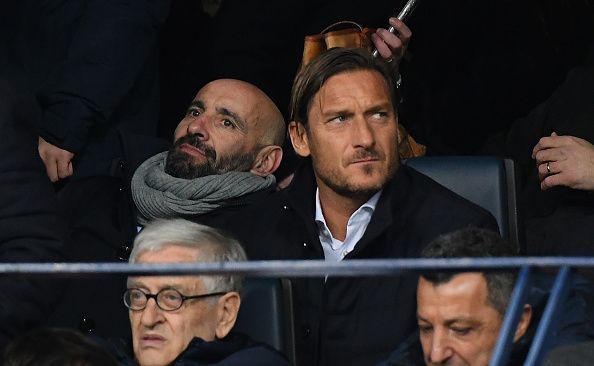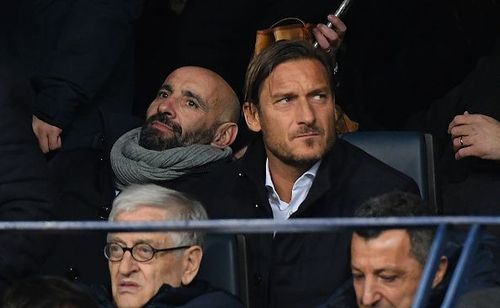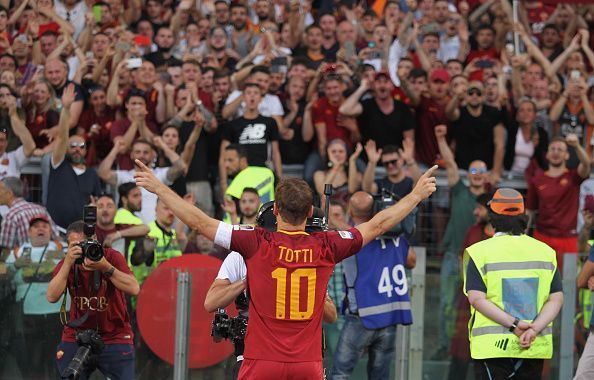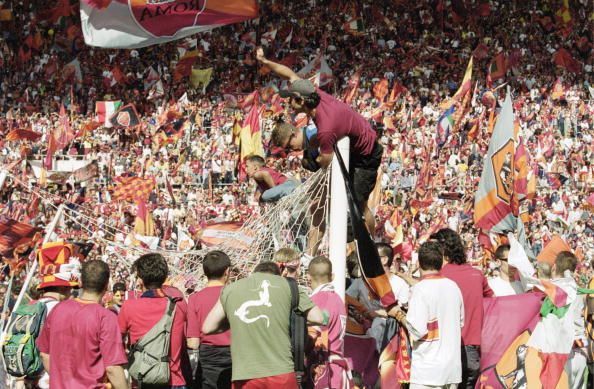
Why Francesco Totti could never rule the AS Roma empire

Augustus, Julius Caesar, Spartacus, Constantine the Great, Marcus Cicero, Nero and others were all defining figures in the rise and fall of ancient Rome.
But while their names and actions are consigned to history, it is Francesco Totti who is currently shaking the foundations of the modern Roman Empire with his emotional departure from AS Roma.
No single figure in the history of AS Roma wields more influence than the former striker, and while his contribution on the field during his 25-year playing career is unmatched, it is his love and devotion to I Giallorossi that makes him so humble when it comes to his achievements.
For Totti, representing AS Roma was a gift. A privilege that was bestowed upon him.
Farewell to a legend
His retirement in 2017 brought unparalleled scenes of emotion to the Stadio Olimpico. Any doubt over what the club meant to Totti, and what Totti meant to the fans, was put to bed on that May afternoon.
Just like the Roman leaders of ancient times, Totti holds a unique control over the Eternal City, and his power is feared by those threatened by his influence.

And that is why Totti has departed the club he never thought he would leave. Appointed as Technical Director, the title proved in reality to be nothing but a token gesture, awarded in recognition of his popularity and status within the club.
Totti was marginalized by chairman James Pallotta, who took advice from trusted confidants in the same way that whispers around the corners of the ancient Senate eventually brought the downfall of great Roman leaders.
Totti's popularity with the fans was simply too powerful to control, especially when it came to assessing the risk of his decisions against the potential for glory.
The defining moment
Totti's desire was to simply make AS Roma great again. He celebrated his one Scudetto win with the club in 2001 and again wanted to feel the satisfaction of leading a project that would emulate that success.
However, his actions were rarely supported, and his ability to make change was never sanctioned as he was kept out of key decisions that fell under the remit of his title.

On Monday, Totti announced his departure from the club at a press conference. His criticism of the owners and current regime was brutal, and served only to highlight how passionate he remains for the club that he devoted his professional playing career to.
His exit was fuelled by nothing but frustration, and it will bring an irreparable split between the owners and the fans.
A figure with no equal
And that is the power of Totti at AS Roma. While he was a part of the boardroom, there was trust from the fans for their actions. Now his departure and criticism will lead to significant unrest within the corridors of power, and beyond.
While his role proved to be marginal, leaving it in the circumstances that he has will be significant, and his word remains key to swaying public opinion.

But while Totti has AS Roma in his heart, making the transition from player to boardroom is a difficult one. While his status made him a superstar at the club, this did not transpire into the business model that dictates what a club can actually achieve.
Tough decisions must be made against the grain, and a tunnel vision for success on the field does not always accommodate rational fiscal thinking.
Boardroom transition
Clubs at the highest level of the modern game must find the right balance between business and sporting success.
A manager will always push for the most expensive players, and while increasing their chances of success will support their request to the board, it is often necessary to say no for the greater good. Finding the perfect balance requires a business head with the equal strength of a football heart.
Totti was purely a football figure at AS Roma, with an ambition to bring nothing but success back to the club.
His interest was not in the financial restrictions imposed by factors out of his control, but from the desire to see the best managers and players again representing his club and challenging for major honours in the process. The vision he had did not include balance sheets.

It was a passion that brought a distorted ideal of what could be achieved at the club. While his experience and passion for the club remains invaluable, his status was an intimidating factor for figures like Pallotta, advisor Franco Baldini and CEO Guido Fienga.
They knew that they could not compete with his popularity and influence, and also did not trust his rose-tinted opinion on the key footballing decisions that needed to be made.
A future without Totti
Now the board must face the aftermath of the fallout, and Totti will remain the hero with those who have a personal rather than professional association with the club.
Any new owner will be keen to appoint him as an immediate guarantee of popularity, but the same issues will arise in the future. The field is Totti's natural boardroom, and he will not find true happiness at the club again unless he takes up a coaching role.
The switch from great player to boardroom is hypothetically perfect, but the practicalities in the reality of it are very different.
It requires very different skills, knowledge and experience, and while the Technical Director role is based on the footballing elements of the business, it is the aspect of primarily considering the fine financial margins that makes the transition such a challenge.

Totti never wanted to end his playing career with AS Roma, he wanted to play forever, but the hands of time dictated otherwise. He clearly still cannot let go. The owners have not used his knowledge and experience effectively, but his status in the boardroom is also very different from that in the changing room.
Totti is an AS Roma legend, and that will not change. But just like the rulers of ancient Rome, he must now accept that his place is consigned to history. He is simply the latest in a long line of great Romans to eventually fall.